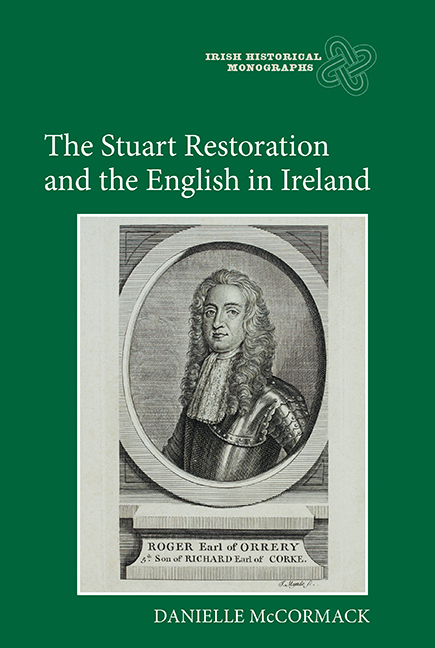Book contents
- Frontmatter
- Contents
- Miscellaneous Frontmatter
- Acknowledgements
- List of abbreviations and conventions
- Introduction
- 1 The political and mental map of 1660s Ireland
- 2 Stuart restoration and the beginnings of Protestant discontent
- 3 Roger Boyle, earl of Orrery, and the evolution of English Protestant identity in Ireland
- 4 Moral and rhetorical challenges to Protestant power
- 5 Charles II and his ministers in Ireland
- 6 The court of claims, popery and Stuart authority
- Conclusion
- Bibliography
- Index
6 - The court of claims, popery and Stuart authority
Published online by Cambridge University Press: 05 July 2016
- Frontmatter
- Contents
- Miscellaneous Frontmatter
- Acknowledgements
- List of abbreviations and conventions
- Introduction
- 1 The political and mental map of 1660s Ireland
- 2 Stuart restoration and the beginnings of Protestant discontent
- 3 Roger Boyle, earl of Orrery, and the evolution of English Protestant identity in Ireland
- 4 Moral and rhetorical challenges to Protestant power
- 5 Charles II and his ministers in Ireland
- 6 The court of claims, popery and Stuart authority
- Conclusion
- Bibliography
- Index
Summary
In the summer of 1662, the government of Ireland underwent important changes. The tensions that had simmered between Protestants and the government during the administration of the lords justices were set to escalate. By the time of Ormond's arrival, the restored monarchy had already demonstrated that its support for the Protestant position was lukewarm. Catholics, meanwhile, had shown that they were adept at gaining letters of restoration from the king, often with the aid of Ormond. Now his official status and presence as lord lieutenant in the kingdom meant that his policy of favouring certain Catholics that he deemed worthy would be followed more rigorously. Potentially, this could lead to an increase in the number of restorable Catholics. At around the same time, the commissioners of the court of claims went to Ireland. The commissioners had power to decide on any cases of restoration or reprisals that had preceded their arrival in Dublin. Their ability to decide upon the nocence (guilt) or innocence of Catholics whose cases they heard removed all possibility of utilising general and universal arguments concerning Catholic guilt as a means of mass exclusion from property.
The arrival of Ormond corresponded with the waning of the power of the lords justices. Indeed, one of the most influential, the earl of Mountrath, was dead. Those who espoused the Protestant interest as one inextricably linked with the adventurers and soldiers were removed to the periphery of politics. They were forced, like Orrery, to comment (admittedly loudly) from the sidelines, or to raise a frenzy in the House of Commons against the proceedings of the court of claims. From a period in which the alarm was constantly raised concerning the Catholic menace, Ireland moved into one in which the very real threat of the English in Ireland emerged as certain Protestants openly undermined the government and others conspired against it. Understanding of this threat proved the most effective means by which to ensure a settlement that favoured Protestants, as politicians stoked the unrest of certain adventurers and of unruly elements in the army and as the government reacted to the danger to its stability that it posed.
- Type
- Chapter
- Information
- The Stuart Restoration and the English in Ireland , pp. 134 - 163Publisher: Boydell & BrewerPrint publication year: 2016

